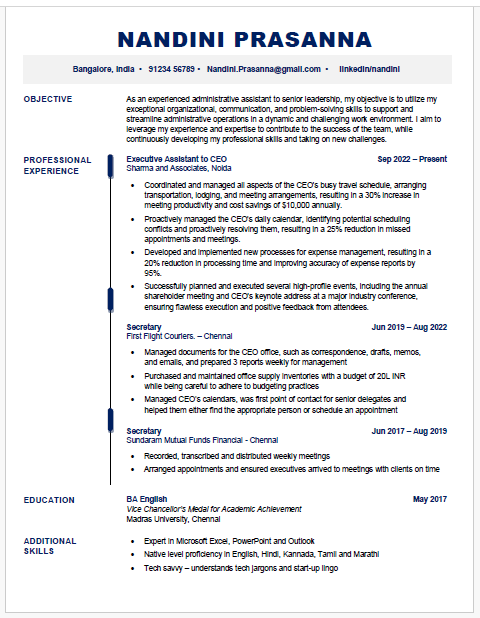Executive Assistant
BA

About this template
This template is made in MS Word so, users can easily customize it to fit their specific needs.
You can effortlessly edit sections, update content, and adjust the layout to reflect your personal style and professional achievements. This flexibility ensures your resume remains polished and tailored to any job application.
Some important and useful soft skills for Executive Assistant
For an Executive Assistant, soft skills are crucial for managing daily operations, supporting executives, and ensuring efficient workflow. Here are ten important and useful soft skills for an Executive Assistant:
1. Communication Skills:
Clear and effective communication is essential for an Executive Assistant. This includes writing emails, preparing reports, and conveying messages accurately. Excellent verbal communication is also necessary for interacting with executives, staff, and external contacts.
2. Organization and Time Management:
Managing multiple tasks, schedules, and deadlines requires exceptional organizational skills. An Executive Assistant must prioritize tasks, maintain an organized workspace, and ensure that executives' schedules are efficiently managed.
3. Attention to Detail:
Precision in handling details is crucial for tasks such as managing calendars, booking travel, and preparing documents. Attention to detail helps prevent errors and ensures that all tasks are completed accurately and efficiently.
4. Discretion and Confidentiality:
Handling sensitive information is a key part of an Executive Assistant's role. They must maintain confidentiality and exercise discretion when dealing with private company matters and personal information.
5. Problem-Solving Skills:
An Executive Assistant often encounters unexpected challenges and must be able to think critically and find effective solutions. This includes addressing scheduling conflicts, resolving administrative issues, and assisting in decision-making processes.
6. Interpersonal Skills:
Building positive relationships with executives, colleagues, and external partners is essential. Interpersonal skills help in managing interactions, resolving conflicts, and fostering a collaborative work environment.
7. Adaptability and Flexibility:
The ability to adapt to changing priorities and environments is vital. An Executive Assistant must be flexible in handling last-minute changes, shifting deadlines, and new tasks, often with little notice.
8. Proactivity and Initiative:
Taking initiative and being proactive in anticipating the needs of executives can greatly enhance efficiency. This includes identifying potential issues, suggesting improvements, and taking steps to address tasks before they become urgent.
9. Multitasking Ability:
Managing multiple responsibilities simultaneously is a common requirement. An Executive Assistant must juggle various tasks such as scheduling, correspondence, and project management without compromising quality.
10. Emotional Intelligence:
Understanding and managing one's emotions, as well as being aware of others' emotions, is key to maintaining a positive and professional demeanor. Emotional intelligence helps in navigating stressful situations, understanding executive preferences, and fostering a harmonious work environment.
Conclusion:
These soft skills enable an Executive Assistant to support executives effectively, ensure smooth office operations, and contribute positively to the organization's overall success.